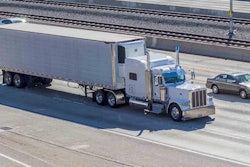A November opinion issued by a federal judge in California bucks a ruling issued by the California Supreme Court in April that established new criteria for how carriers should discern employee drivers vs. independent contractors.
Judge James Otero, a U.S. District Judge in California’s Central District, said in an opinion issued November 15 that federal law, when it comes to truck transportation, pre-empts the state’s strict ABC employee/contractor test — a departure from the state’s high court’s ruling in Dynamex v. Superior Court.
However, the ruling (coming in the case of Alvarez v. XPO Logistics) does not set a precedent. The overall case is still in process. Only if it or another of the lawsuits around federal pre-emption were to reach appeals stage, and be decided on, would precedent against use of the ABC test be set.
Trucking groups in the state — the Western States Trucking Association and the California Trucking Association — argue that the California Supreme Court ruling establishing the ABC test could hamper carriers ability to use independent contractor drivers and could effectively eliminate the use of owner-operators in the state.
Both groups also have separate, ongoing lawsuits against the Dynamex decision. The U.S. District Court in Northern California heard oral arguments in Western States’ lawsuit in November.
Greg Feary, partner at the Indianapolis-based Scopelitis, Garvin, Light, Hanson & Feary transportation law firm, said the ABC test “had never been used in California” before the Dynamex case. Judge Otero affirmed in his argument that the Federal Aviation Administration Authorization Act (F4A) and its prohibition on states enacting laws that affect a motor carrier’s prices, routes or services effectively pre-empted application of the ABC classification test set by the California Supreme Court, says Feary.
Federal Ninth Circuit Court of Appeals precedent in the well-known Dilts v. Penske case had established the opposite was the reality when it came to federal pre-emption of California’s state-level wage and hours protections — of most consequence in a raft of subsequent litigation, namely, were the state’s required paid meal and rest breaks for employees.
In the XPO case, Feary explains, “the court further says,” effectively “‘we’re not saying these wage and hour rules are directed at prices, routes or services. We’re saying, the test that was conceived of in Dynamex, that is the thing that impacts prices, routes, and services of a motor carrier. When you use that test, that’s a problem; it is preempted by the F4A – not so the underlying laws.”
Joe Rajkovacz of WSTA, which has one of the ongoing lawsuits in a separate federal court seeking to overturn the Dynamex decision and its ABC test ruling, says that the decision in the XPO case has little bearing on the outcome of their case, at least directly. “We are hopeful our judge adopts the same legal reasoning and doesn’t side with the state and labor and dismiss,” he says.










